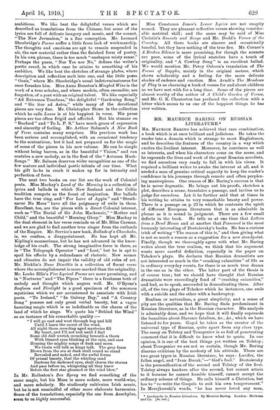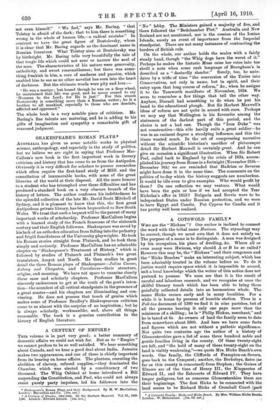MR. MATJRICE BARING ON RUSSIAN LITERATURE."
MR. MAURICE BARING has achieved that rare combination, a book which is at once brilliant and judicious. He takes the reader into a domain which is strange to most Englishmen, and he describes the features of the country in a way which excites the liveliest interest. Moreover, he convinces as well as interests, and when his characters come on the scene, and he expounds the lives and work of the great Russian novelists. we find ourselves very ready to fall in with his views. It required a brilliant writer to awake the interest at all, and it needed a man of genuine critical sagacity to keep the reader's confidence in his journeys through remote and often perplex- ing masterpieces. One reason of Mr. Baring's success is that he is never dogmatic. He brings out his proofs, sketches a plot, describes a scene, translates a passage, and invites us to judge for ourselves. Let it be further said that at times in his writing he attains to very remarkable beauty and power. There is a passage on p. 23 in which he contrasts the spirit of different European literatures that is as admirable in phrase as it is sound in judgment. There are a few small defects in the book. He tells us at one time that Letters from a Dead House and at another that Possessed is the most humanly interesting of Dostoievsky's books. He has a curious trick of writing "The reason of this is," and then giving what is not so much a reason as a suggestion for a new standpoint. Finally, though we thoroughly agree with what Mr. Baring writes about the true realism, we think that his argument wants more careful definition, especially in the paper on Tchekov's plays. He declares that Russian dramatists are not interested so much in the "crashing calamities" of life as in ordinary everyday events, for there is as much true drama in the one as in the other. The latter part of the thesis is of course true ; but we should have thought that Russian dramatists were exceedingly fond of "crashing calamities," and had, so to speak, succeeded in domesticating them. After all, of the two plays of Tchekov which he instances, one ends with a suicide and the other with a bankruptcy.
Realism or naturalism, a great simplicity, and a sense of pity are the qualities that Mr. Baring finds predominant in Russian literature, as in the Russian character. His analysis is admirably done, and we hope that it will finally supersede the banalities about Slavonic fatalism, &c., &c., which we have listened to for years. Gogol he takes as the creator of the universal type of Russian, quite apart from any class type. The essay on Tolstoy and Tourgeniev is so full of penetrating comment that it is difficult to know what to quote. In our opinion, it is one of the best things yet written on Tolstoy; about Tourgeniev we are not so certain, though Mr. Baring disarms criticism by the modesty of his attitude. There are two great types in Russian literature, he says : Lucifer, the fallen angel, and "Ivan Durak,"—" God's fool." Dostoievsky is the personification of the second and Tolstoy of the first. Tolstoy always hankers after the second, but cannot attain to it because he cannot humble himself, cannot accept the ordinary scheme of things. He calls himself a Christian, but has to " re-write the Gospels to suit his own temperament." In Merejkowski's words, "he has never loved any man,
• Landmarks in Russian Literature. By Maurice Baring. London : Methuen and Co. [68. net.]
not even himself." " We feel," says Mr. Baring, " that Tolstoy is afraid of the dark; that to him there is something wrong in the whole of human life,—a radical mistake." In contrast we have the great figure of Dostoievsky, whom it is clear that Mr. Baring regards as the dominant name in Russian literature. What Tolstoy aims at Dostoievsky was by birthright. Mr. Baring tells very beautifully the tale of that tragic life which could not sour or narrow the soul of the man. The characteristics of his nature were generosity, catholicity, and sweet reasonableness ; but there was some- thing freakish in him, a. core of madness and passion, which enabled him to see as no other novelist has seen into the heart of darkness. But the ultimate words were pity and love :—
" He was a martyr ; but bound though he was on a fiery wheel, he maintained that life was good, and he never ceased to cry 'Hosanna to the Lord; for He is just !' For this reason Dostoievsky is something more than a Russian writer; he is a brother to all mankind, especially to those who are desolate, afflicted and oppressed."
The whole book is a very notable piece of criticism. Mr. Baring's fine talents are maturing, and he is adding to his gifts of imagination and sympathy a remarkable gift of reasoned judgment.















































 Previous page
Previous page